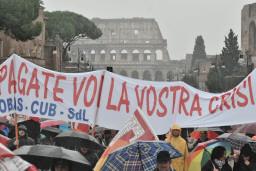Tens of thousands of workers took to the streets of Italian cities under a sea of umbrellas on Friday for a general strike against the government's economic policy called by Italy's biggest, left-leaning CGIL union.
CGIL said workers were striking for ''more work, better salaries, pensions and rights'' as well as protesting against the government's ''insufficient'' measures to deal with the economic crisis.
Workers also carried black-edged flags and held a minute's silence in remembrance of those who have died in workplace accidents, for which Italy has the worst record in Europe.
CGIL leader Guglielmo Epifani said some 200,000 people had taken part in the main protest in Bologna, while adherence to the strike had been especially high ''in the factories in the north'' of the country.
The union said around 50% of workers at Fiat's Mirafiori plant had joined the strike, while around 16% of workers in Italian businesses across the country had taken part.
In Rome, 30,000 workers were joined by students and some transport workers, while in Milan numbers reached 100,000, and in Naples 40,000, according to CGIL.
In Palermo and Ancona, some protestors staged sit-ins at the Greek consulates in the cities in solidarity with Alexis Grigoropoulos, the 15-year-old whose shooting by police in Athens on Saturday has sparked a week of riots in Greece.
Neither of Italy's other large unions, CISL and UIL, took part in the strike.
CISL general secretary Raffaele Bonanni said striking against the economic crisis was not useful.
''CGIL has called a general strike that doesn't help workers, doesn't help to build a serious policy against the economic crisis and accentuates divisions instead of aiding the cooperation of all the trade unions,'' he said.
''Conflict is the salt of democracy but nothing does more harm to democracy than conflict as an end in itself''.
Politicians including Youth Minister Giorgia Meloni also hit out at the strike.
''I always have respect for people who go out into the streets to protest but this doesn't seem to me to be a useful initiative in a moment of crisis,'' she said.
Pier Ferdinando Casini, leader of the centrist UDC, said that in the light of economic and natural ''catastrophes'', ''Italy needs anything but a strike''.
Epifani hit back at criticism, arguing that a strike was ''always a way of achieving an aim, not an end in itself''.
''To CISL and UIL I have nothing to say but I'm sorry that we are not here together because the reasons for this strike are sacrosanct,'' he said.









